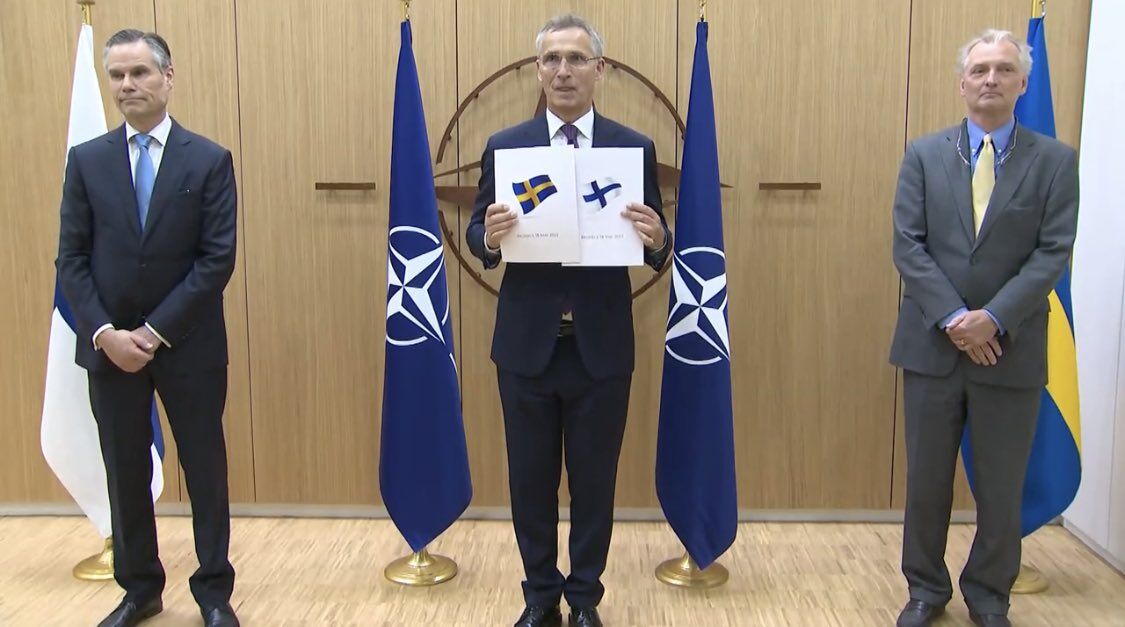Speaking in an interview with the website of the Strategic Council on Foreign Relations, Mehdi Shapouri, referring to the decision of Sweden and Finland to join NATO and submitting their request to the Secretary General of the military alliance, Jens Stoltenberg, noted: Finland has the longest border with Russia and this is an important strategic development that NATO becomes Russia’s new neighbor with a 1,300-kilometer border.
Saying that Sweden and Finland have increased their military cooperation with NATO militarily since 2014 and after the annexation of Crimea, he said: Although this integration in practice has happened before and is now only being recognized, this recognition also has consequences, and if Russia gets into tension with Sweden and Finland, NATO will come to their defense. Under such circumstances, Russia will be faced with limitations.
The expert on international affairs, saying that NATO expansion to the north will have strategic implications for Russia, noted: Sweden and Finland were neutral during the Cold War, and their joining to Russia’s enemies would impose heavy security and military costs on Moscow in the Baltic Sea and this concentration and increase in costs has detrimental consequences for Russia. Russia has announced that international military activity in the North is on the rise, and that turning the North into an international arena for military operations is a nuisance to which it cannot remain indifferent.
Shapouri continued: Sweden and Finland believe that Russia by attacking Ukraine, has shown that it is unpredictable and that they should seek to improve their security, but by doing so, Russia will also create challenges for those countries, however, those challenges remain to the extent that they do not lead to confrontation with NATO. In fact, Russia could not do more in the current situation, despite the threats it initially made. Moscow has already cut off gas exports to Finland and announced it would build more military bases in the region. Given Finland’s growing economic dependence on Russia, such measures will pose challenges to the country.
Sweden, Finland membership; new blood in NATO veins
The member of the faculty of the Research Institute for Strategic Studies, saying that Russia will suffer from the recent developments, added: Membership of Sweden and Finland is certainly a turning point in NATO power and the global balance among the big powers. We have already seen a decline in NATO cohesion, and Trump had also announced that NATO is an obsolete alliance; but with such developments, new blood flowed in the veins of NATO and the bonds of unity within that military alliance became fresh.
He pointed to China’s position on NATO expansion and its feeling of threat to the movements of the military alliance and its aggressive approach, adding: Sweden and Finland membership would increase NATO military strength and this issue, in the face of rivalries that exists between the West and Russia as well as the United states and China, is considered as a strong point for the West.
Referring to Turkey’s opposition to membership of Finland and Sweden in NATO and the technical issues that NATO has announced for that membership, Shapouri said: Those two countries have completely different conditions with regard to Ukraine and meet the standards required for NATO membership. By increasing their military budget to 2 percent, they have brought this figure to the level required by NATO.
He added: In fact, because of their feeling of being threatened, they were willing to join the alliance, and this decision was not initially made by NATO. Meanwhile, Turkey will resolve the membership issues of the two countries through negotiations and receiving concessions, and the Turkish foreign minister welcomed the diplomacy and announced that he would ask Sweden and Finland for written guarantees.
Referring to Russia’s threats to deploy missile systems and establish military bases in Kaliningrad, the international affairs expert said: In the current situation, Russia cannot escalate tensions; ultimately, however, the nature of Russia’s relations with NATO, as well as Sweden and Finland, depends on the fate of the Ukraine war and the status of sanctions against Russia. If the Ukraine war escalates, tensions between NATO and Russia will escalate exponentially; but an agreement between Russia and Ukraine will ease tensions.
Non-return of Russia-NATO relations to conditions before Ukraine war
He continued: Given this level of differences between Russia and NATO, the situation will not return to before the Ukraine war. Such differences will be at the same level at best and will increase at worst condition. Russia may only want to change the situation and disrupt the scene with changes; for example, Mr. Putin will not run in the 2024 elections or will step down and Russia’s position will be adjusted with the presence of another person in power.
He reminded: Although Russia had a good relationship with NATO a decade or two after the Cold War, but NATO has been Russia’s number one enemy for almost a decade, and this issue will not go away in the short term, and the two sides will continue to confront each other. Although it was hoped that those tensions would be managed through occasional treaties and agreements, and that the Ukraine war would now end in an agreement, however the war cut off communications and made the return through the same path difficult.










0 Comments